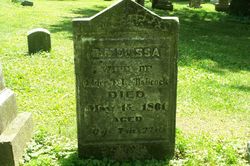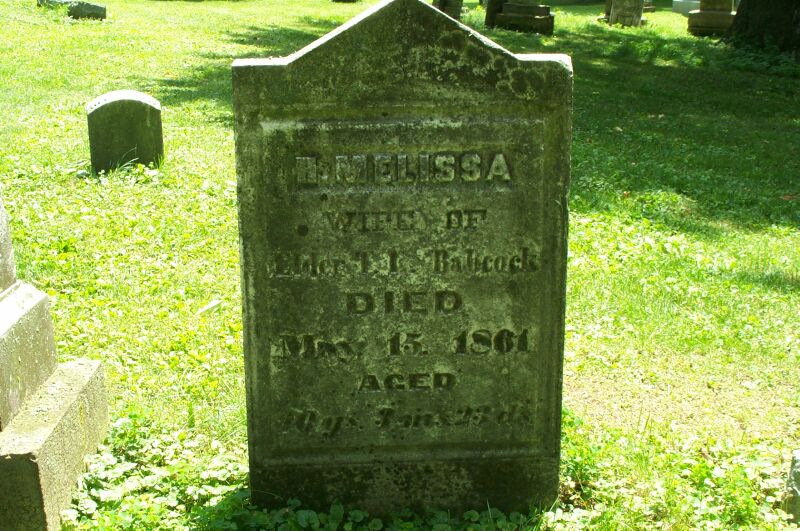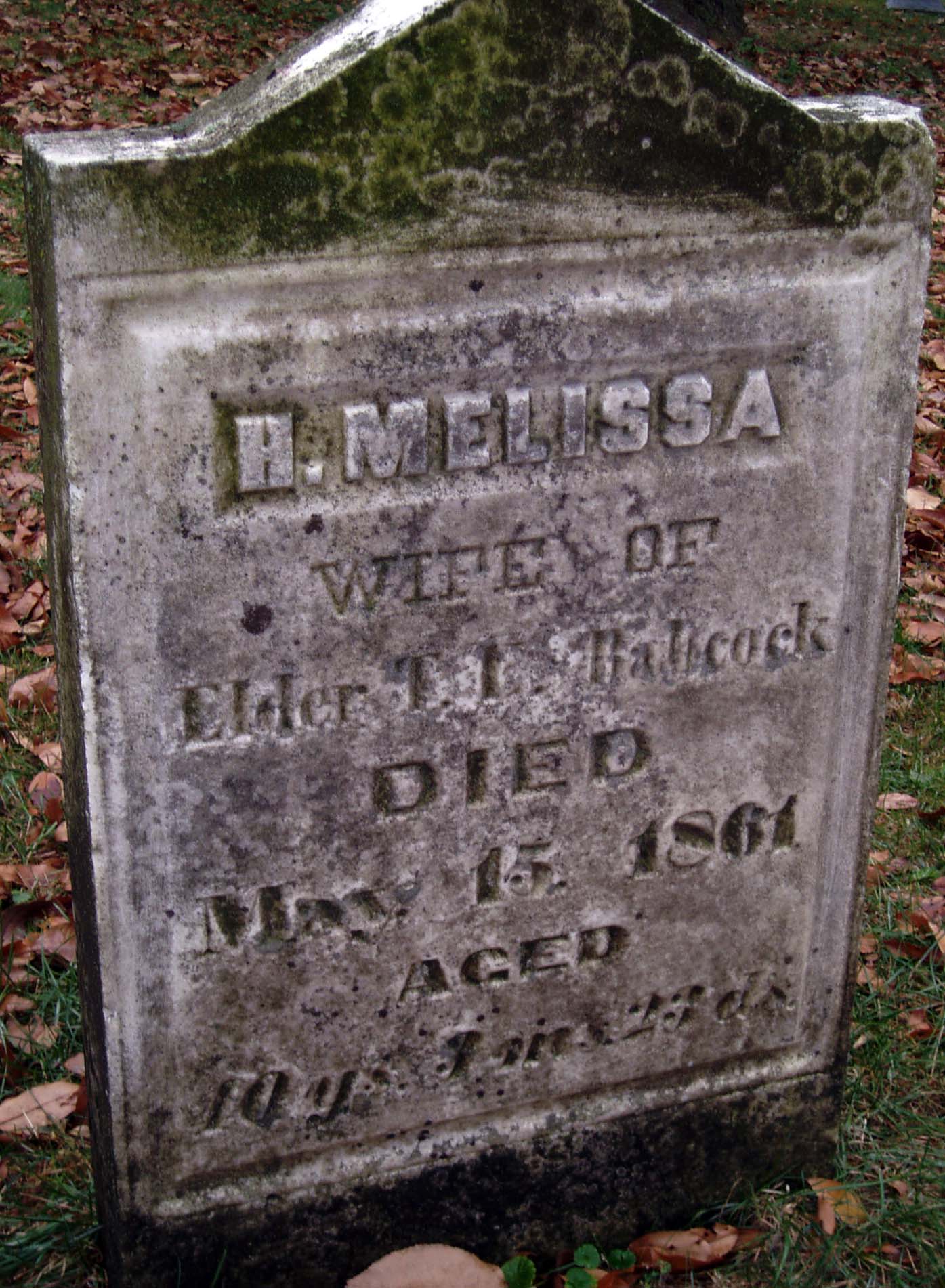"The Sabbath Recorder", Vol 17, No 49, p 195, July 4, 1861.
Mrs. Eld. Thomas E. Babcock.
It is difficult to truly and accurately estimate human character. In few things are men more liable to err. The historian or biographer has his hero, and follows some bias which takes its rise in his own views. Cromwell said:
"Paint me just as I am;
All else my soul abhors."
There is often a greater self-denial and heroism in the discharge of the duties of the hearth stone than is known to the hero of the battle field. Yet history tells us of the one, and forgetfulness holds the other. Warren said, as he fell, "I is sweet to die for one's country." He gained immortal honors. Yet many patriotic hearts, in dying for their country, have felt its sweetness and remained forever unknown. But this fact is no discouragement to gallant spirits. To do good unseen, nor ask nor wish for praise, is a virtue too rare in human character.
A noble example is given in the quietude and devotion to home duties in the life of whose name heads this article. She was born in the town of Truxton, Cortland Co., N. Y., Jan. 22d, 1821, At an early age she made a profession of religion, and united with the church at Lincklaen, Chenango Co., where her parents then resided; Feb. 19, 1842, she was married to T. E. Babcock; and in 1843, he having accepted a call to the pastorate of the church at Persia, Cattaraugus Co., N. Y., they removed their home to that place. They were subsequently settled with the churches at Richburg and Independence, N. Y. In 1855, he having been called by the church at Albion, Wis., she united with that church where she remained till her death, May 15th, 1861. Her funeral was largely attended; nearly all the ministering brethren of the surrounding churches were present, among whom were Elders R. G. Burdick, Z. Campbell, O. P. Hull, and V. Hull. A discourse was preached by the latter, from Eccl. 12: 5.
In all the churches where they had dwelt, she had warm and earnest friends. A letter from a member of one of these churches, since her death says: "She was a good woman. Her death will be lamented here. We had learned to appreciate her worth." She has left no bad examples; was known as one following the things which made for peace. What can be said of too few professed disciples of Christ, was conspicuous in her character, viz., she made no trouble from an unguarded tongue; society received no jargon from her superfluous or careless words; she possessed the power Dr. Adam Clark, so praised in his wife, viz., she could keep a secret. Her estimate of character was careful, and rarely differed from facts. Retiring in nature, she seemed sometimes distant to those seeking her acquaintance. Yet it was rather that the friendship which would approach her might shoe itself, and that she might not err in the friend she received. Whoever came within the circle of her confidants, were retained there, and were warmer in friendship. But she rests from her labors, and her works will follow her.
Eld. Babcock had just been called to the pastorship of the Albion Church for the seventh year, when he was asked by the Missionary Board to take the charge of a mission in Kansas, and in view of the importance of an early occupation of that field, he consented to go in case the conditions could be satisfactorily arranged. At this stage of the negotiation, she expected to leave a home and social circle to which years had contributed their attractions and endearments, for a frontier point among strangers. The struggle it cost her to be reconciled to such a change of situation, was severe and earnest; but it was successful. She had laid the sacrifice upon the altar, and awaited with cheerfulness the downward stroke of the gleaming knife. But when, by the turn of circumstances over which she had no control, the offering was handed back to her, her joy was like that which Abraham felt when he laid down the knife which he held over his son, to clasp him again to his bosom. But from privileges so lately resigned and restored, she has been called to those which infinitely surpass them.
During the years of his ministry, Eld. Babcock has been settled with three churches previous to coming to Albion. A heavy hand has been laid upon him, and his house left desolate. Surely, because man goeth to his long home, the mourners go about the streets. May the sad bereavement bring him nearer home to the house not made with hands. May his life long be spared to be the spiritual guide and light of the people of his charge. A. R. C.
(Courtesy of Erin)
"The Sabbath Recorder", Vol 17, No 49, p 195, July 4, 1861.
Mrs. Eld. Thomas E. Babcock.
It is difficult to truly and accurately estimate human character. In few things are men more liable to err. The historian or biographer has his hero, and follows some bias which takes its rise in his own views. Cromwell said:
"Paint me just as I am;
All else my soul abhors."
There is often a greater self-denial and heroism in the discharge of the duties of the hearth stone than is known to the hero of the battle field. Yet history tells us of the one, and forgetfulness holds the other. Warren said, as he fell, "I is sweet to die for one's country." He gained immortal honors. Yet many patriotic hearts, in dying for their country, have felt its sweetness and remained forever unknown. But this fact is no discouragement to gallant spirits. To do good unseen, nor ask nor wish for praise, is a virtue too rare in human character.
A noble example is given in the quietude and devotion to home duties in the life of whose name heads this article. She was born in the town of Truxton, Cortland Co., N. Y., Jan. 22d, 1821, At an early age she made a profession of religion, and united with the church at Lincklaen, Chenango Co., where her parents then resided; Feb. 19, 1842, she was married to T. E. Babcock; and in 1843, he having accepted a call to the pastorate of the church at Persia, Cattaraugus Co., N. Y., they removed their home to that place. They were subsequently settled with the churches at Richburg and Independence, N. Y. In 1855, he having been called by the church at Albion, Wis., she united with that church where she remained till her death, May 15th, 1861. Her funeral was largely attended; nearly all the ministering brethren of the surrounding churches were present, among whom were Elders R. G. Burdick, Z. Campbell, O. P. Hull, and V. Hull. A discourse was preached by the latter, from Eccl. 12: 5.
In all the churches where they had dwelt, she had warm and earnest friends. A letter from a member of one of these churches, since her death says: "She was a good woman. Her death will be lamented here. We had learned to appreciate her worth." She has left no bad examples; was known as one following the things which made for peace. What can be said of too few professed disciples of Christ, was conspicuous in her character, viz., she made no trouble from an unguarded tongue; society received no jargon from her superfluous or careless words; she possessed the power Dr. Adam Clark, so praised in his wife, viz., she could keep a secret. Her estimate of character was careful, and rarely differed from facts. Retiring in nature, she seemed sometimes distant to those seeking her acquaintance. Yet it was rather that the friendship which would approach her might shoe itself, and that she might not err in the friend she received. Whoever came within the circle of her confidants, were retained there, and were warmer in friendship. But she rests from her labors, and her works will follow her.
Eld. Babcock had just been called to the pastorship of the Albion Church for the seventh year, when he was asked by the Missionary Board to take the charge of a mission in Kansas, and in view of the importance of an early occupation of that field, he consented to go in case the conditions could be satisfactorily arranged. At this stage of the negotiation, she expected to leave a home and social circle to which years had contributed their attractions and endearments, for a frontier point among strangers. The struggle it cost her to be reconciled to such a change of situation, was severe and earnest; but it was successful. She had laid the sacrifice upon the altar, and awaited with cheerfulness the downward stroke of the gleaming knife. But when, by the turn of circumstances over which she had no control, the offering was handed back to her, her joy was like that which Abraham felt when he laid down the knife which he held over his son, to clasp him again to his bosom. But from privileges so lately resigned and restored, she has been called to those which infinitely surpass them.
During the years of his ministry, Eld. Babcock has been settled with three churches previous to coming to Albion. A heavy hand has been laid upon him, and his house left desolate. Surely, because man goeth to his long home, the mourners go about the streets. May the sad bereavement bring him nearer home to the house not made with hands. May his life long be spared to be the spiritual guide and light of the people of his charge. A. R. C.
(Courtesy of Erin)
Family Members
Advertisement
Explore more
Sponsored by Ancestry
Advertisement






